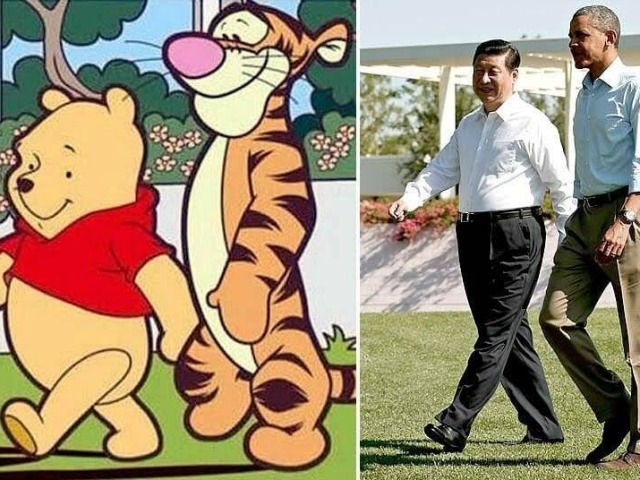China has banned references to the children’s literary character Winnie the Pooh due to comparisons made between him and the Chinese president, a report from the Financial Times has revealed.
Instances of Winnie the Pooh censorship were reported this weekend on Sina Weibo, a Chinese social media platform similar to Twitter, while a series of Winnie the Pooh-themed stickers were removed from the instant messaging service WeChat.
Although officials have not provided an explanation for its removal, many strongly suspect that it is due to internet memes comparing Winnie to Chinese President Xi Jinping. Comparisons between the two figures became particularly prominent in 2013 after Jinping was snapped strolling through a garden with Barack Obama.
Jinping’s figure appears short and round, compared to Obama’s tall and leaner physique, reminiscent of an image of Winnie the Pooh walking alongside his friend Tigger:
Another example includes Jinping sharing an awkward handshake with Japanese Prime Minister Shinzo Abe, which drew comparisons between an image of Winnie the Pooh shaking the hand of Eeyore, a donkey known for gloominess and pessimistic outlook:
This latest report on censorship in China follows government attempts to clamp down on content related to Nobel Prize-winning dissident Liu Xiaobo, whose death last week of liver cancer served as a reminder of Chinese human rights abuses and how dissenters are silenced.
Visitors to China this week reported that this effort was so successful that average citizens responded to mentions of Xiaobo’s name with blank stares, while staff who treated him for his liver cancer claimed not to know who he was.
Criticism of the Chinese government, and especially the president, is strictly illegal in China, falling under former leader Hu Jintao’s vision of the “promotion of a harmonious society.”
Censorship of both the press and social media is, therefore, part and parcel of everyday life in China. For example, Chinese officials last month banned three social media sites from streaming video until they have undergone a rigorous government review of their activity.
However, with the rise of technological expertise, many people in China are finding ways around the censorship by dodging what is known as the ‘Great Firewall,’ which selectively blocks content chosen by the government. Blocked sites include Facebook, YouTube, Google, Twitter and Instagram, as well as the websites of most western news organizations.
You can follow Ben Kew on Facebook, on Twitter at @ben_kew, or email him at bkew@breitbart.com

COMMENTS
Please let us know if you're having issues with commenting.